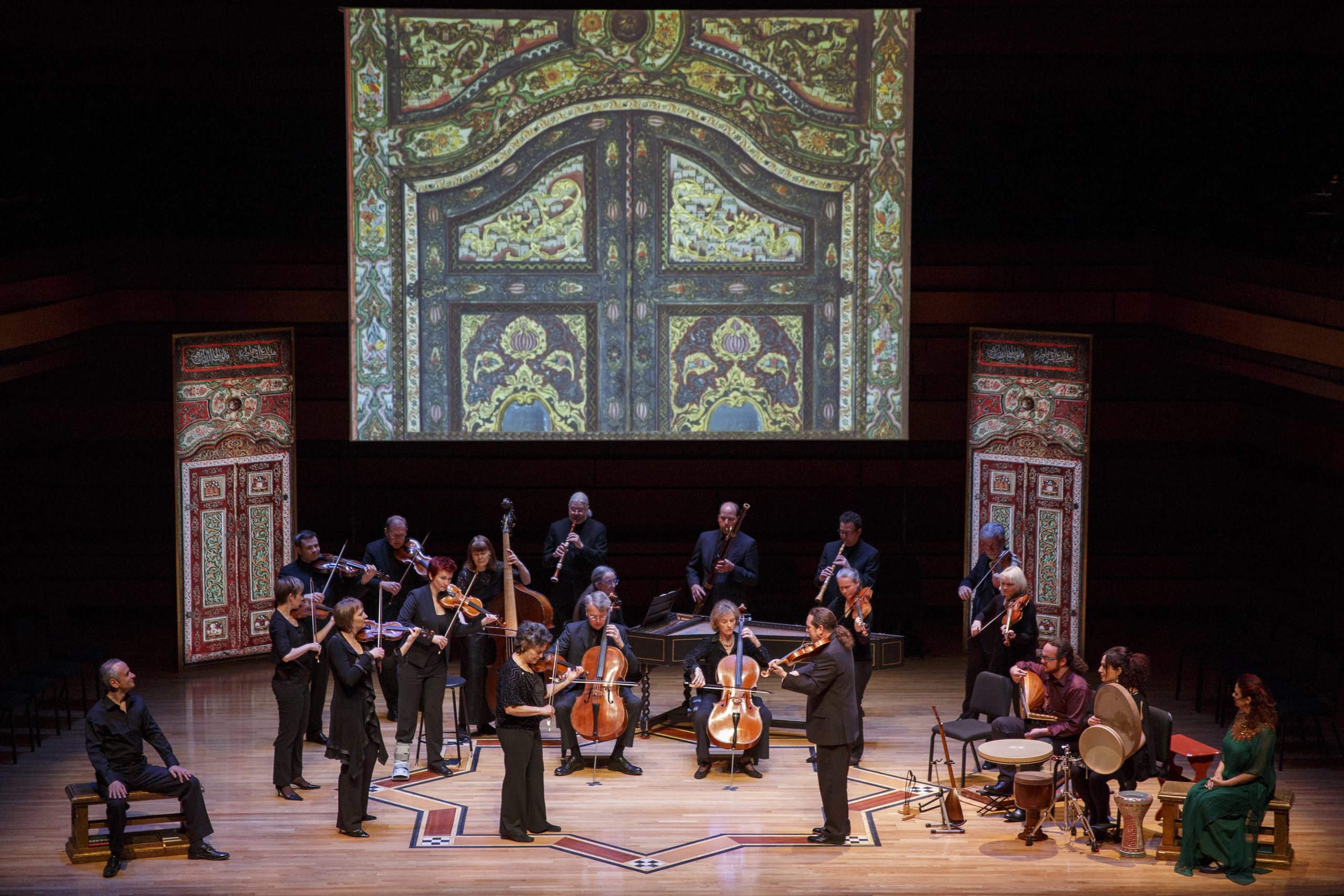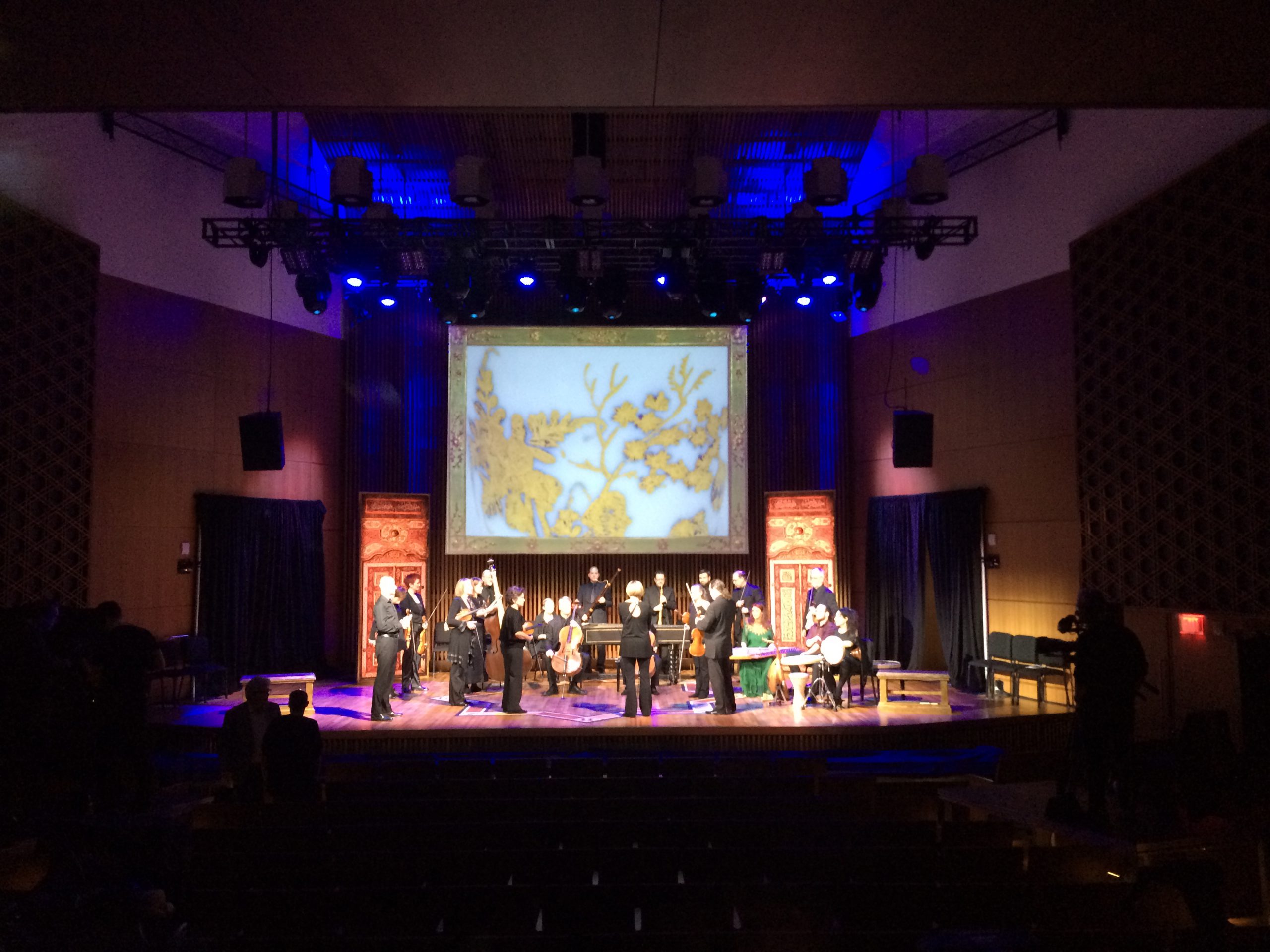by Patrick Jordan, viola Tafelmusik’s performance of Alison Mackay’s latest creation, Tales of Two Cities: The Leipzig-Damascus Coffee House, at the Aga Khan Museum last week on Friday, December 9 was many things. It was on the one hand the culmination of the production of the video component of our upcoming DVD of the program. It was also and all of a sudden, one of the most moving and intense performances I have experienced in quite some time.
Tafelmusik Baroque Orchestra and Trio Arabica rehearsing at the Aga Khan Museum. Photo: Mara Brown
Most of the video being shot on Friday was of the audience, not the orchestra — that was done on Thursday. Also, the audio portion of the program had already been completed before this show. So it was in some ways a regular concert with the slightly disconcerting elements of cameramen on the stage and the house lights up to full. Those are distractions to be sure, although being able to see the public so clearly revealed an audience that was a mix of extraordinarily familiar faces and some very new ones. Among the new ones I particularly noticed a couple which I guessed to be of Middle Eastern descent, maybe in their 40s, seated six to seven rows back, in the centre; the man of the couple seemed particularly engaged by the entire program: the actor Alon Nashman, Trio Arabica, the images, and Tafelmusik.
We went out for the second half, and when we reached the very powerful sequence of images that tie the history of Leipzig and Damascus to the current plight of Syrian refugees living in Germany and continuing to celebrate their culture, I again noticed the couple in row 6–7. The woman was gently stroking the arm of her partner, who was becoming visibly more upset as the sequence unfolded. He began to weep. I almost couldn’t stay on stage, I so wanted to go out to offer additional comfort to this fellow. A poem relating and embracing the cultures of various European cities and Damascus follows that sequence, and the man was continuing to weep, his partner continuing to offer solace. I felt almost helpless on stage.For whatever reason, I allowed the distractions of my day to get the better of me (this happens to all of us on stage in some moment or another). I don’t know if it was the extraordinary circumstance or one of my own all-too-reliable demons, but I didn’t achieve my personal best in the most exposed bit I have in this program (which happens in the first half). I came offstage feeling less than great about myself.
The show ends with a popular song in Arabic, during which the phenomenal singer Maryem Toller encourages the audience to join in. And there before me was the fellow in row 6–7, now beaming and joyously singing this obviously very familiar tune.
One of the perks of being a musician who performs in public routinely is that I get thanked a lot. People clap for me, people tell me “Great concert!” after a show (or even approach me on the street), people ask for an autograph — the variety of thank-you’s is large. And I’m genuinely grateful for the support, I really am. However, it is not often that I want to fall on my knees and thank an audience member like the fellow in row 6–7. But thank him for what exactly? For allowing himself to be so moved? For cleansing me of my preoccupations with my own performance? Because whatever I did today, it obviously didn’t do a whole heck of a lot to blunt the bigger message for him. To thank him for the bigger gift of grace? And where does that grace begin and end? I am certainly eternally grateful to my colleagues on stage and behind the scenes at Tafelmusik. And grateful to the Aga Khan Museum for probably putting me in the path of someone new. But it also reaches very far back, to gratitude to my mother, who came to every concert I played as a kid, and whose support probably made it possible for me to be on that stage today. And to my childhood viola teacher who saved my life at key moments.
For a certainty, I left the concert knowing that today was a good day for art, and a good day for the meeting of souls.

Tafelmusik Baroque Orchestra, Trio Arabica and Alon Nashman at the world premiere of Tales of Two Cities at the Isabel Bader Centre for Performaning Arts, May 17, 2016. Photo: Bruce Zinger

